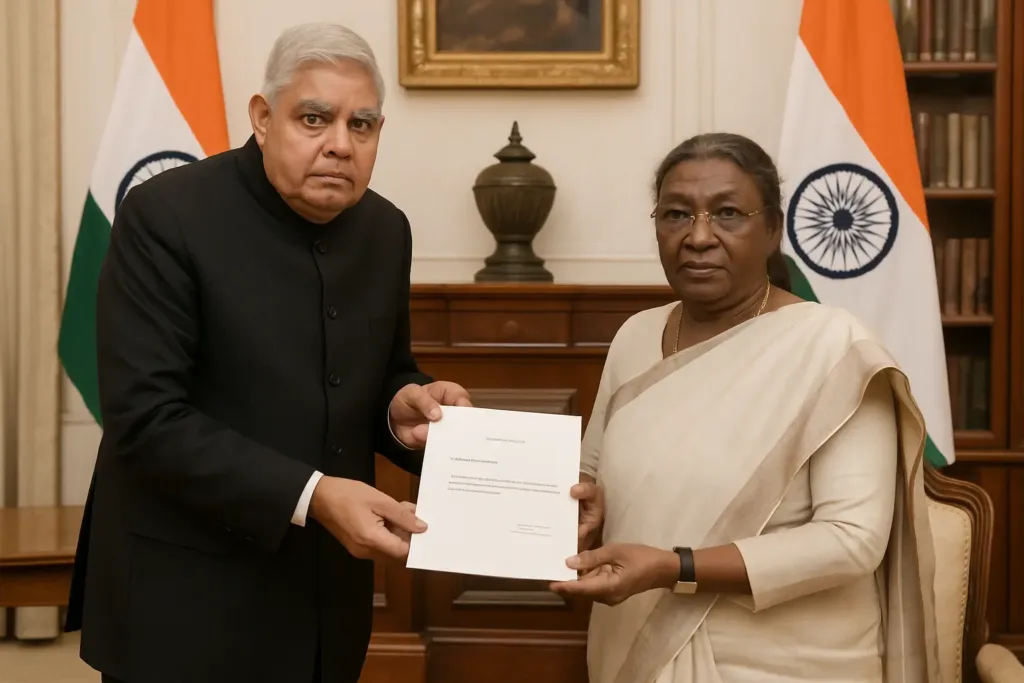
🗞️ A Political Earthquake in Lutyens’ Delhi
In an unexpected political development, Jagdeep Dhankhar, the 14th Vice President of India, resigned from office on July 22, 2025, citing health reasons. The announcement came with little warning and stunned political observers, parliamentarians, and the public alike. Having served for barely two years out of a five-year term, Dhankhar’s resignation is being seen as both unprecedented and politically consequential, particularly because of its timing and circumstantial ambiguity.
As one of the highest constitutional authorities and the Chairman of the Rajya Sabha, the Vice President’s role is central to the functioning of India’s parliamentary democracy. The sudden exit of such a figure naturally invites not just curiosity, but also deeper scrutiny into the circumstances, motivations, and implications behind the decision.
📄 The Official Statement: Health Over Politics
On the first day of the Monsoon Session of Parliament, Dhankhar handed his resignation letter to President Droupadi Murmu, invoking Article 67(a) of the Indian Constitution, which allows the Vice President to step down by submitting a written resignation to the President.
The official letter read:
“To prioritise health care and abide by medical advice, I hereby resign as Vice President of India, effective immediately.”
The Ministry of Home Affairs swiftly issued a gazette notification, confirming that the Vice President’s office was now vacant. His tenure, which began in August 2022, was supposed to last until 2027. The resignation thus marks a significant deviation from the norm, especially given the stature and symbolic significance of the post.
🩺 Health or Political Pressure? What We Know So Far
While the stated reason was health-related—and at 74, Dhankhar is known to have experienced minor cardiac issues—political observers are not entirely convinced that this is the whole story.
⚖️ A History of Tensions with the Government
Jagdeep Dhankhar’s tenure as Vice President was marked by frequent controversies and assertive rulings during parliamentary sessions. He was not shy about clashing with both the Opposition and Treasury benches when it came to upholding rules and decorum in the Rajya Sabha.
Some insiders point to a recent flashpoint where Dhankhar allowed a motion to discuss judicial accountability following a high-profile corruption scandal involving a judge. This decision reportedly caught the ruling party off guard and may have been perceived as an act of defiance.
Such incidents fed into a narrative that Dhankhar was no longer acting as a rubber-stamp constitutional head, but as a more independent and assertive figure—a trait not always appreciated in the current political climate.
⏱️ The Curious Sequence of Events
The day of the resignation saw several unusual developments:
High-level meetings in the PMO were cancelled or postponed.
Key ministers, including the Home Minister and Law Minister, were notably absent from public view.
Dhankhar was seen attending meetings earlier in the day and appeared to be in normal health, adding to public confusion about the timing of the resignation.
🗣️ Opposition Raises the Alarm
The Opposition, including leaders from the Congress, TMC, and DMK, welcomed Dhankhar’s dignified conduct as Rajya Sabha chairman but hinted that the resignation may have been orchestrated due to political rifts. Congress leader Mallikarjun Kharge called the move “regrettable” and “unprecedented,” while TMC MP Derek O’Brien said the Vice President “was always fair, even when he disagreed.”
Some even claimed that “internal conflicts within the NDA” or Dhankhar’s growing discomfort with recent legislative procedures could have played a role.
📚 A Rare Event in Indian Political History
Only two Vice Presidents in India’s history—V.V. Giri (1969) and R. Venkataraman (1984)—have resigned before completing their terms. Both left the post to contest Presidential elections. Dhankhar’s case is unique because:
He resigned mid-term without pursuing another political position.
He cited health reasons, not political ambition.
The resignation occurred at a delicate moment in Indian parliamentary proceedings, with multiple sensitive bills lined up for the Monsoon Session.
This makes his departure one of the most surprising exits from a constitutional office in modern Indian history.
🔜 The Road Ahead: Who Fills the Vacuum?
👨⚖️ Interim Leadership
Until a new Vice President is elected, Deputy Chairman Harivansh Narayan Singh will preside over Rajya Sabha proceedings. His role, however, will be more procedural than political.
🗳️ Constitutional Provisions
Under Article 68 of the Indian Constitution:
“An election to fill a vacancy caused by the resignation of the Vice President shall be held as soon as possible.”
The Election Commission of India (ECI) is expected to announce the election schedule within weeks. Given the surprise factor, both the ruling NDA and the Opposition INDIA bloc will treat this as a prestige battle, potentially reshaping alliances in the process.
🧩 Political Jockeying Begins
The resignation has set off a flurry of activity in Delhi’s power corridors. Potential contenders for the Vice President’s office include:
A former Chief Justice, to bring legal balance.
A senior tribal or Dalit leader, as a symbolic outreach.
A neutral consensus figure, to reduce parliamentary hostilities.
Meanwhile, Dhankhar’s exit may also open up space for speculation about future reshuffles in the Union Cabinet or other high offices.
🏛️ Reflecting on Dhankhar’s Tenure
🌾 From Farmer’s Son to Vice President
Born in Rajasthan’s Jhunjhunu district, Dhankhar came from humble beginnings and rose through the ranks as a lawyer, politician, and governor. His term as Governor of West Bengal brought him national attention due to his frequent confrontations with the Mamata Banerjee government.
His assertive style continued in the Rajya Sabha, where he often stood firm on procedural matters, ensured Opposition voices were heard, and attempted to uphold legislative integrity.
🫱 A Graceful Exit
In his resignation note, Dhankhar thanked:
Prime Minister Narendra Modi
President Droupadi Murmu
Members of Parliament
He ended with a message of unity, institutional dignity, and a call for “collaborative governance.“


